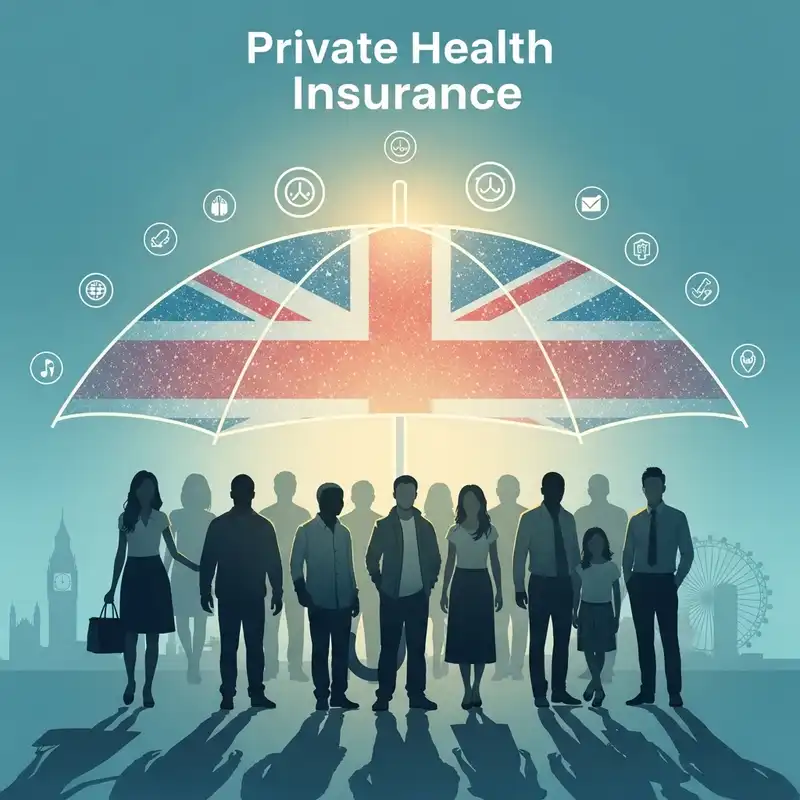TL;DR
In a world where 2025 projections indicate nearly 1 in 2 people in the UK will face a cancer diagnosis in their lifetime, true personal growth and thriving relationships depend on more than ambition – they require a strategic shield. Discover how to build an 'antifragile' life, one where unexpected health crises or financial setbacks don't derail your dreams. Learn how tailored solutions like Personal Sick Pay for tradespeople, nurses, and electricians, alongside comprehensive Family Income Benefit, Income Protection, Critical Illness Cover, and Life Protection, create an essential safety net.
Key takeaways
- The Fragile Package: This is a porcelain vase marked "Handle with Care." Any drop, shock, or pressure will cause it to shatter. In life, this represents a financial situation with no savings or protection – a single missed paycheque leads to crisis.
- The Robust Package: This is a block of steel. It can be dropped, knocked, and mishandled. It will arrive at its destination dented and scratched, but intact. It resists damage but doesn't improve. This is a person with some savings, who can weather a short-term storm but will be severely depleted by a long-term illness.
- The Antifragile Package: This package contains a set of specialised tools. Every time the package is jostled, a mechanism inside uses that energy to sharpen the tools. The more volatile the journey, the more effective the tools become upon arrival. This is the antifragile life. A health scare doesn't just end; it becomes the catalyst for better lifestyle habits, a stronger family bond, and a more secure financial plan. The shock creates a net positive outcome.
- Nourishment, Not Just Diet: Focus on whole foods. The Mediterranean diet, rich in vegetables, fruits, lean protein, and healthy fats, is consistently linked to lower rates of chronic diseases. Prioritise gut health by incorporating fibre and fermented foods. Small changes, like swapping a sugary snack for a piece of fruit, have a cumulative, powerful effect. To help our clients on this journey, we at WeCovr provide complimentary access to our AI-powered calorie and nutrition tracker, CalorieHero, making it easier to build and maintain healthy eating habits.
- Movement is Medicine: The NHS recommends at least 150 minutes of moderate-intensity activity a week. This isn't just about weight management. Exercise is a potent tool for reducing stress, improving cognitive function, and boosting your immune system. Find a blend of activities you enjoy – whether it’s brisk walking, cycling, strength training, or yoga.
In a world where 2025 projections indicate nearly 1 in 2 people in the UK will face a cancer diagnosis in their lifetime, true personal growth and thriving relationships depend on more than ambition – they require a strategic shield. Discover how to build an 'antifragile' life, one where unexpected health crises or financial setbacks don't derail your dreams. Learn how tailored solutions like Personal Sick Pay for tradespeople, nurses, and electricians, alongside comprehensive Family Income Benefit, Income Protection, Critical Illness Cover, and Life Protection, create an essential safety net. Explore how a Gift Inter Vivos can secure legacies, and crucially, how private health insurance provides rapid access to care, bypassing public sector delays. This isn't just about financial protection; it's about safeguarding your time, energy, and freedom to pursue true personal development, deepen connections, and live your most fulfilling life, no matter what tomorrow brings.
The statistic is sobering, yet it reflects a reality we must all confront. Sourced from Cancer Research UK, the projection that one in two of us will face cancer is a stark reminder of life's inherent uncertainty. We spend our lives pursuing growth – in our careers, our personal development, and our relationships. We set goals, we build businesses, we raise families. But what happens when an unforeseen event, like a serious illness or injury, strikes?
For many, it means a sudden, jarring halt. Ambition gives way to anxiety. Financial stability evaporates. Dreams are put on hold, sometimes indefinitely. This is the definition of a fragile existence: one that shatters under pressure.
But there is another way. It’s a concept known as antifragility. Coined by the thinker Nassim Nicholas Taleb, antifragility goes beyond mere resilience or robustness. The resilient object withstands a shock and stays the same; the antifragile object is struck by a shock and becomes stronger.
This article is your blueprint for building an antifragile life. It’s about creating a personal and financial structure so robust that when life’s inevitable challenges arise, you don’t just survive – you adapt, learn, and emerge with greater strength and purpose. It’s about creating a strategic shield composed of proactive health choices and intelligent financial protection, so you can continue to grow, thrive, and live fully, no matter what surprises lie ahead.
Understanding Antifragility: Beyond Mere Resilience
To truly grasp how to build an unstoppable future, we must first understand the difference between being fragile, robust, and antifragile. Imagine three packages being sent through the post.
-
The Fragile Package: This is a porcelain vase marked "Handle with Care." Any drop, shock, or pressure will cause it to shatter. In life, this represents a financial situation with no savings or protection – a single missed paycheque leads to crisis.
-
The Robust Package: This is a block of steel. It can be dropped, knocked, and mishandled. It will arrive at its destination dented and scratched, but intact. It resists damage but doesn't improve. This is a person with some savings, who can weather a short-term storm but will be severely depleted by a long-term illness.
-
The Antifragile Package: This package contains a set of specialised tools. Every time the package is jostled, a mechanism inside uses that energy to sharpen the tools. The more volatile the journey, the more effective the tools become upon arrival. This is the antifragile life. A health scare doesn't just end; it becomes the catalyst for better lifestyle habits, a stronger family bond, and a more secure financial plan. The shock creates a net positive outcome.
Applying this to your life means putting systems in place that transform potential chaos into a source of strength. Financial protection is not merely a parachute; it's the trampoline that allows you to bounce back higher than before.
The Foundation of Antifragility: Your Health and Wellbeing
Before we erect any financial shield, we must first strengthen the person it is designed to protect: you. An antifragile life is built on a foundation of proactive health. Insurance is a crucial reactive measure, but your daily habits are the first line of defence.
A Proactive Approach to Health:
-
Nourishment, Not Just Diet: Focus on whole foods. The Mediterranean diet, rich in vegetables, fruits, lean protein, and healthy fats, is consistently linked to lower rates of chronic diseases. Prioritise gut health by incorporating fibre and fermented foods. Small changes, like swapping a sugary snack for a piece of fruit, have a cumulative, powerful effect. To help our clients on this journey, we at WeCovr provide complimentary access to our AI-powered calorie and nutrition tracker, CalorieHero, making it easier to build and maintain healthy eating habits.
-
Movement is Medicine: The NHS recommends at least 150 minutes of moderate-intensity activity a week. This isn't just about weight management. Exercise is a potent tool for reducing stress, improving cognitive function, and boosting your immune system. Find a blend of activities you enjoy – whether it’s brisk walking, cycling, strength training, or yoga.
-
The Power of Sleep: In our "always-on" culture, sleep is often the first thing we sacrifice. Yet, consistent, quality sleep (7-9 hours for most adults) is fundamental to memory consolidation, cellular repair, and emotional regulation. Poor sleep is linked to a higher risk of numerous health problems. Establish a relaxing bedtime routine and protect your sleep as fiercely as you would any other valuable asset.
-
Mind Your Mental Health: The connection between mental and physical health is undeniable. Chronic stress can weaken the immune system and increase inflammation. Practices like mindfulness, meditation, or simply spending time in nature can significantly lower stress levels. Nurturing your social connections is also vital; strong relationships are a powerful buffer against life's difficulties.
Building these habits doesn’t make you invincible, but it makes you more robust. It gives your body and mind the best possible chance to handle the pressures of modern life and recover from illness or injury more effectively.
The Financial Shield: Why Ambition Isn't Enough
A healthy body is one pillar of an antifragile life. A secure financial base is the other. Ambition and a strong work ethic are admirable, but they cannot pay the mortgage if you are unable to work for six months.
The state safety net is far smaller than many believe. As of 2025, Statutory Sick Pay (SSP) in the UK stands at a modest level, currently £116.75 per week, payable for up to 28 weeks. For the vast majority of households, this amount would not even cover the weekly food shop, let alone rent, mortgage payments, and utility bills. (illustrative estimate)
The Financial Reality of Illness in the UK:
- Low Savings Buffer: A 2024 report from the Financial Conduct Authority (FCA) highlighted that millions of UK adults have less than £1,000 in savings, leaving them acutely vulnerable to any income shock.
- The Cost of Cancer: Macmillan Cancer Support frequently reports on the significant financial burden of a cancer diagnosis. This isn't just about lost income; it includes extra costs like travel to hospitals, increased heating bills, and home modifications, often averaging hundreds of pounds per month.
- The Self-Employed Precipice: For the UK’s 4.25 million self-employed individuals (ONS, 2024), the situation is even more precarious. There is no employer sick pay scheme – if you don’t work, you don’t get paid. SSP is the only state provision, and it's simply not enough.
This is where a personal financial shield becomes non-negotiable. It’s the structured, guaranteed support system that bridges the gap between state provision and your actual financial needs, ensuring a health crisis does not become a financial catastrophe.
Your Personal Protection Toolkit: A Policy for Every Purpose
Building your financial shield involves selecting the right tools for the job. There isn’t a single "best" policy; the optimal strategy is often a layered combination of different types of cover, tailored to your specific circumstances.
Income Protection (IP)
Often described by financial experts as the one policy every working adult should consider.
- What it is: Provides a regular, tax-free monthly income if you are unable to work due to any illness or injury.
- Who it’s for: Essential for anyone who relies on their income to pay their bills. It is the absolute bedrock of financial planning for employees and the self-employed alike.
- Key Features:
- Deferment Period: The time you wait between falling ill and receiving your first payment. This can be tailored from 1 week to 12 months. A longer deferment period means a lower premium.
- Level of Cover: You can typically cover 50-70% of your gross income.
- Definition of Incapacity: The best policies use an 'Own Occupation' definition, meaning it pays out if you are unable to do your specific job, not just any job.
Critical Illness Cover (CIC)
This policy is designed to deal with the immediate and significant financial impact of a life-altering diagnosis.
- What it is: Pays out a one-off, tax-free lump sum if you are diagnosed with one of a list of specified serious conditions.
- How it’s different from IP: It provides a lump sum for a specific diagnosis, whereas IP provides a monthly income for any condition that stops you from working.
- What it can be used for: The freedom is yours. Many use it to pay off their mortgage, cover the costs of private treatment, adapt their home, or simply give themselves the financial breathing space to recover without worry. The most common claims are for cancer, heart attack, and stroke.
Life Protection (Life Insurance)
This is the foundational cover for anyone with financial dependents.
- What it is: Pays a lump sum to your loved ones (beneficiaries) if you pass away during the policy term.
- Types:
- Term Insurance: Covers you for a fixed period (e.g., the length of your mortgage). It can be Level Term (payout amount stays the same) or Decreasing Term (payout amount reduces over time, typically in line with a repayment mortgage).
- Whole of Life: Covers you for your entire life and is guaranteed to pay out whenever you die. Often used for Inheritance Tax planning.
- Who needs it: Anyone with a partner, children, or other relatives who depend on their income, or anyone with a mortgage or significant debts.
Family Income Benefit (FIB)
An alternative or supplement to a traditional lump-sum life insurance policy.
- What it is: Instead of a single large payout on death, FIB provides a regular, tax-free monthly or annual income to your family. This income is paid for the remainder of the policy term.
- Why it's useful: It replaces the deceased’s lost salary in a manageable way, making it easier for the surviving family to budget for ongoing household expenses. It can often be a more affordable way to secure a high level of protection for a young family.
Comparing Your Core Personal Protection Options
| Feature | Income Protection | Critical Illness Cover | Life Protection | Family Income Benefit |
|---|---|---|---|---|
| Pays out on... | Inability to work (any illness/injury) | Diagnosis of a specified serious illness | Death | Death |
| Payment Type | Regular monthly income | One-off lump sum | One-off lump sum | Regular monthly income |
| Primary Purpose | Replace lost earnings | Cover major costs after diagnosis | Clear debts, provide for dependents | Provide ongoing family income |
| Tax Status | Tax-free | Tax-free | Tax-free (if in trust) | Tax-free |
Specialised Protection for Modern Workers and Tradespeople
The UK workforce is diverse, and financial protection should be too. A generic plan may not suit the specific risks faced by those in physically demanding or freelance roles.
For Tradespeople, Nurses, and Electricians
For those in higher-risk professions where a physical injury can mean an immediate stop to all earnings, a more specialised form of cover is vital.
- Personal Sick Pay Insurance: This is a type of short-term income protection designed for manual workers and those in riskier jobs.
- Key Differences from standard IP:
- Shorter Deferment Periods: Often pays out after just one week.
- Shorter Claim Periods: Typically pays out for a maximum of 12 or 24 months per claim.
- Simpler Underwriting: Can be easier to obtain for those in physical roles.
Example: An electrician working as a sole trader falls from a ladder and breaks their wrist, leaving them unable to work for 3 months. Statutory Sick Pay is insufficient. Their Personal Sick Pay policy, with a one-week deferment, kicks in quickly and pays them £2,000 a month, allowing them to cover their bills and focus entirely on recovery without financial stress.
For the Self-Employed and Freelancers
If you are your own boss, you are also your own HR department and your own safety net. Without an employer providing sick pay, group life assurance, or other benefits, the responsibility falls squarely on you.
For this dynamic and growing part of the workforce, Income Protection is not a luxury; it is an essential business continuity tool. A comprehensive IP policy provides a reliable income stream, ensuring that your personal and business finances can survive a period where you are unable to generate revenue. Critical Illness Cover is equally important, providing capital that could be used to hire temporary help or simply keep the business afloat during a period of recovery.
The Business Owner's Blueprint: Protecting Your Company's Future
An antifragile strategy extends beyond personal finance; it must also protect the business you’ve worked so hard to build. Business protection insurance ensures that the entity itself can withstand the shock of losing a key individual.
Key Person Insurance
- What it is: A policy taken out and paid for by the business on the life or health of a crucial employee – this could be a founder, a top salesperson, or a lead developer. The business is the beneficiary.
- Why it’s needed: The payout provides a cash injection to manage the disruption. It can be used to cover lost profits, recruit and train a replacement, reassure investors, or repay a business loan that the key person had guaranteed. It turns a potential company-ending event into a manageable challenge.
Executive Income Protection
- What it is: An Income Protection policy owned and paid for by the company for a director or senior employee.
- Benefits: It’s a highly valued employee benefit that protects your most important people. The premiums are typically a legitimate business expense, making it a tax-efficient way to provide cover. It can also offer higher levels of cover than a personal IP policy.
Shareholder or Partnership Protection
- What it is: Ensures that if a business partner or shareholder dies or is diagnosed with a critical illness, the remaining owners have the funds to buy their share of the business.
- How it works: Each partner takes out a life and/or critical illness policy on the other partners. These policies are usually placed in a business trust and linked to a legal agreement (a cross-option agreement). If a partner dies, the policy pays out to the surviving partners, giving them the cash to purchase the shares from the deceased's estate.
- Why it’s essential: It guarantees business continuity. It prevents a deceased partner’s shares from passing to a family member who may have no desire or ability to run the company. It ensures a fair value is paid for the shares and provides a smooth, planned exit strategy.
Comparing Your Business Protection Options
| Product | Who is Insured? | Who Pays the Premium? | Who Receives the Payout? | Main Purpose |
|---|---|---|---|---|
| Key Person | A crucial employee/director | The business | The business | Business continuity, cover lost profit |
| Executive IP | A director/employee | The business | The insured individual | Protects the individual's income |
| Shareholder | Business partners/shareholders | The partners or the business | The surviving partners | To buy out a deceased/ill partner's shares |
Securing Your Legacy: The Role of Gift Inter Vivos
A core part of building an antifragile life is ensuring that your wealth can be passed on to the next generation efficiently and securely. Inheritance Tax (IHT) can significantly reduce the value of the estate you leave behind.
Under current UK rules, a gift made to an individual is known as a Potentially Exempt Transfer (PET). If you live for seven years after making the gift, it falls completely outside of your estate for IHT purposes. However, if you die within those seven years, the gift becomes chargeable to IHT on a sliding scale.
This creates a period of uncertainty. This is where Gift Inter Vivos (GIV) insurance comes in.
- What it is: A specialised type of life insurance policy designed to cover the potential IHT liability on a gift. It is a term assurance policy, typically with a decreasing benefit that matches the reducing IHT liability over the 7-year period.
- Example: A grandparent gifts £200,000 to their grandchild to help them buy their first home. They are concerned about the potential IHT bill if they were to pass away within 7 years. They take out a GIV policy. If they die in year 3, the policy pays out a lump sum that covers the exact IHT due on the gift, ensuring the grandchild does not have to find the money to pay the tax bill. It provides certainty and peace of mind.
Accelerating Your Recovery: The Power of Private Medical Insurance (PMI)
The final, critical component of your antifragile shield addresses one of the biggest variables in any health crisis: time. While the NHS provides exceptional care, it is currently facing unprecedented pressure, with waiting lists for consultations and treatments at record highs, as confirmed by 2025 data from NHS England.
Waiting months for a diagnosis or surgery is not just a physical strain; it's a mental and financial one. It extends the period of uncertainty, delays your return to work, and impacts your quality of life.
Private Medical Insurance (PMI) is the tool that gives you back control over time. It is not a replacement for the NHS but a powerful complement to it.
Key Benefits of PMI:
- Speed: Get prompt access to specialist consultations, diagnostic scans (like MRI and CT), and treatment, often within days or weeks instead of many months.
- Choice: Select your preferred consultant and hospital from an extensive network across the UK, and schedule treatment at a time that suits you.
- Comfort: Benefit from a private room, en-suite facilities, and more flexible visiting hours, creating a better environment for recovery.
In the context of antifragility, PMI is transformative. By drastically reducing the time between feeling unwell and getting treated, it minimises the overall disruption to your life. A swift recovery means less time off work, less financial impact, and a quicker return to pursuing your goals and spending time with your family. It allows you to get back to thriving.
Navigating the world of PMI can be complex, with different levels of cover, excess options, and hospital lists. An expert broker, like our team at WeCovr, can be invaluable. We compare plans from all the UK’s leading insurers to find a policy that matches your specific health priorities and budget.
Building Your Antifragile Strategy: A Step-by-Step Guide
You now have the blueprint. Here is how to start construction.
-
Step 1: Conduct an Honest Audit. Take stock of your current situation. What protection do you already have through your employer? What are your monthly outgoings? Who depends on you financially? What are your biggest financial liabilities (e.g., mortgage, business loans)?
-
Step 2: Define Your Priorities. What is your biggest vulnerability? Is it a loss of monthly income? The risk of a large, unexpected cost? Protecting your business? Ensuring your family is secure if you’re no longer around? Rank these in order of importance.
-
Step 3: Layer Your Protection. Realise that you don't need to choose just one product. An antifragile strategy often involves a combination:
- Foundation: Income Protection to secure your salary.
- Lump Sum: Critical Illness Cover to clear debts and create a buffer.
- Dependents: Life Insurance or Family Income Benefit to protect your family's future.
- Health: Private Medical Insurance to ensure fast access to treatment.
-
Step 4: Seek Expert Advice. This is not a journey to take alone. The financial protection market is complex, and the implications of getting it wrong are significant. At WeCovr, we specialise in helping individuals, families, and business owners build their strategic shield. We take the time to understand your unique situation and search the entire market to find the most suitable and cost-effective solutions. We handle the complexity so you can have clarity and confidence.
Conclusion: From Surviving to Thriving
Building an antifragile life is one of the most empowering actions you can take. It is a conscious decision to move from a position of vulnerability to one of strength. It is the understanding that while we cannot control every event that happens to us, we can absolutely control how prepared we are to meet them.
The shield you build with products like Income Protection, Critical Illness Cover, and Private Medical Insurance is not a sign of pessimism. It is a declaration of optimism. It is the ultimate enabler of personal growth, allowing you to take calculated risks, pursue your passions, and deepen your relationships with the profound peace of mind that comes from knowing your foundations are secure.
This isn't just about financial planning. It's about buying back your time, protecting your energy, and securing your freedom to live the most expansive, fulfilling life possible – no matter what tomorrow brings.
Isn't Statutory Sick Pay enough to live on?
Can I get insurance cover if I have a pre-existing medical condition?
How much cover do I actually need?
What is the main difference between Life Insurance and Critical Illness Cover?
Is the payout from Income Protection tax-free?
Why should I use a broker like WeCovr instead of going directly to an insurer?
Sources
- Office for National Statistics (ONS): Mortality, earnings, and household statistics.
- Financial Conduct Authority (FCA): Insurance and consumer protection guidance.
- Association of British Insurers (ABI): Life insurance and protection market publications.
- HMRC: Tax treatment guidance for relevant protection and benefits products.
































